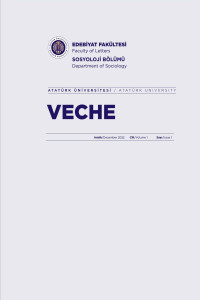Abstract
Yapay zeka robotların günümüz dünyasında giderek artan bir şekilde kullanılması, bu meselelerin çağdaş edebiyat içerisinde de sıklıkla temsil edilmesine neden olmuştur. Özellikle sanal gerçeklik konusu üzerinde durmayı amaçlayan yazarlar, buradan hareketle gerçekliğin yeniden oluşturulması ve bu bağlamda toplumsal yaşamın yeniden şekillendirilmesini irdelerler. Ian McEwan, Machines Like Me adlı romanında Adam ile Eve adındaki yapay zeka robotların insan yaşamının her alanına nasıl dâhil olduklarını işler. Bu makalede, yapay zeka robotların McEwan’ın romanında nasıl irdelendiği ve postmodern etik bağlamında Baumancı açıdan etiğin ne derecede yeniden oluşturulduğu meseleleri tartışılmaktadır. İnsanların özel yaşamlarına dâhil olan yapay zeka robotların gerçeklik algısını yeniden yazdıkları örneğinden hareketle, etik ve ahlak olgularının da yeniden oluşturulduğu meselesi Bauman’ın postmodern etik değerlendirmesi ışığında ele alınmaktadır
References
- Bauman, Z. (1993). Postmodern Ethics. Oxford: Blackwell Publishers.
- Bauman, Z. (1994). Alone Again: Ethics After Certainty. Demos: London.
- Bauman, Z. (1995). Life in Fragments: Essays in Postmodern Morality, Blackwell, Oxford UK & Cambridge.
- Bauman, Z. (2003). Imitations of Postmodernity. New York: Routledge.
- Beck, S. (2020). Do We Want Dystopia? The New Atlantis, Number 61, Winter: 87-96,
- Bradley, A. & Tate, A. (2010). The New Atheist Novel. Bloomsbury Academic.
- Camus, A. (2005). The Myth of Sisyphus, trans. O’Brien, J. London: Penguin.
- Colombino, L. (2022). Consciousness and the nonhuman: the imaginary of the new brain sciences in Ian McEwan’s Nutshell and Machines Like Me, Textual Practice, 36:3, 382-403, DOI: 10.1080/0950236X.2022.2030116
- Hejaz, N. & Singh, R. (2022). The therapeutic power of poetry in Ian McEwan’s Saturday and The Children Act, Journal of Poetry Therapy, DOI:10.1080/08893675.2022.2068357
- Hillard, G. (2010). The Limits of Rationalism in Ian McEwan’s SATURDAY, The Explicator, 68:2, 140-143, DOI: 10.1080/00144941003723931
- Kelemen, M. & Peltonen, T. (2001). Ethics, morality and the subject: the contribution of Zygmunt Bauman and Michel Foucault to postmodern’s business ethics. Scandinavian Journal of Management, 17(2), 151-166.
- Księżopolska, I. (2020). Can Androids Write Science Fiction? Ian McEwan’s Machines like Me. Critique: Studies in Contemporary Fiction. DOI: 10.1080/00111619.2020.1851165
- Malcolm, D. (2002). Understanding Ian McEwan. University of South Carolina Press.
- Marotta, V. (1995). Reviews: Zygmunt Bauman, Postmodern Ethics (Blackwell, 1993). Thesis Eleven, 42(1), 144–147.
- McEwan, I. (2019). Machines Like Me. Penguin.
- Rennison, N. (2005). Contemporary British Novelists. London: Routledge.
Abstract
The increasing use of artificial intelligence robots in today’s world has caused these issues to be frequently represented in contemporary literature. In particular, the authors, who aim to focus on the subject of virtual reality, examine the re-creation of reality and the reshaping of social life in this context. In his novel Machines Like Me, Ian McEwan also deals with how artificial intelligence robots named Adam and Eve are involved in human life. This article discusses how artificial intelligence robots are examined in McEwan's novel and to what extent ethics is reconstructed from a Baumanian perspective in the context of postmodern ethics. Based on the example that artificial intelligence robots, which are included in all parts of people’s private lives, rewrite their perception of reality, the issue of reconstructing ethical and moral phenomena is discussed in the light of Bauman’s postmodern ethical evaluation.
References
- Bauman, Z. (1993). Postmodern Ethics. Oxford: Blackwell Publishers.
- Bauman, Z. (1994). Alone Again: Ethics After Certainty. Demos: London.
- Bauman, Z. (1995). Life in Fragments: Essays in Postmodern Morality, Blackwell, Oxford UK & Cambridge.
- Bauman, Z. (2003). Imitations of Postmodernity. New York: Routledge.
- Beck, S. (2020). Do We Want Dystopia? The New Atlantis, Number 61, Winter: 87-96,
- Bradley, A. & Tate, A. (2010). The New Atheist Novel. Bloomsbury Academic.
- Camus, A. (2005). The Myth of Sisyphus, trans. O’Brien, J. London: Penguin.
- Colombino, L. (2022). Consciousness and the nonhuman: the imaginary of the new brain sciences in Ian McEwan’s Nutshell and Machines Like Me, Textual Practice, 36:3, 382-403, DOI: 10.1080/0950236X.2022.2030116
- Hejaz, N. & Singh, R. (2022). The therapeutic power of poetry in Ian McEwan’s Saturday and The Children Act, Journal of Poetry Therapy, DOI:10.1080/08893675.2022.2068357
- Hillard, G. (2010). The Limits of Rationalism in Ian McEwan’s SATURDAY, The Explicator, 68:2, 140-143, DOI: 10.1080/00144941003723931
- Kelemen, M. & Peltonen, T. (2001). Ethics, morality and the subject: the contribution of Zygmunt Bauman and Michel Foucault to postmodern’s business ethics. Scandinavian Journal of Management, 17(2), 151-166.
- Księżopolska, I. (2020). Can Androids Write Science Fiction? Ian McEwan’s Machines like Me. Critique: Studies in Contemporary Fiction. DOI: 10.1080/00111619.2020.1851165
- Malcolm, D. (2002). Understanding Ian McEwan. University of South Carolina Press.
- Marotta, V. (1995). Reviews: Zygmunt Bauman, Postmodern Ethics (Blackwell, 1993). Thesis Eleven, 42(1), 144–147.
- McEwan, I. (2019). Machines Like Me. Penguin.
- Rennison, N. (2005). Contemporary British Novelists. London: Routledge.
Details
| Primary Language | English |
|---|---|
| Subjects | Sociology |
| Journal Section | Research Articles |
| Authors | |
| Publication Date | December 20, 2022 |
| Published in Issue | Year 2022 Volume: 1 Issue: 1 |
Content of this journal is licensed under a Creative Commons Attribution NonCommercial 4.0 International License

